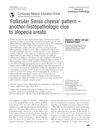 August 2024 in “Skin Research and Technology”
August 2024 in “Skin Research and Technology” Omega-6 and LDL cholesterol increase the risk of hair loss.
 68 citations,
June 2005 in “Expert Opinion on Therapeutic Targets”
68 citations,
June 2005 in “Expert Opinion on Therapeutic Targets” Oestrogens help maintain healthy skin, heal wounds, and may protect against skin aging and cancer.
3 citations,
September 2021 in “BioEssays” Dandruff might be caused by changes in how hair follicles naturally release oils and an immune response to this imbalance.
 5 citations,
June 2019 in “JAAD Case Reports”
5 citations,
June 2019 in “JAAD Case Reports” Imiquimod used intravaginally for cervical issues can cause temporary hair loss, especially if severe side effects occur.
 4 citations,
April 2022 in “Dermatologic Therapy”
4 citations,
April 2022 in “Dermatologic Therapy” Injecting scalp tissue micrografts is a safe and effective treatment for hair loss after COVID-19.
 8 citations,
May 2018 in “Primary Care: Clinics in Office Practice”
8 citations,
May 2018 in “Primary Care: Clinics in Office Practice” Doctors should use a detailed patient history and physical exam to diagnose joint pain, and consult a rheumatologist early for suspected autoimmune diseases.
 15 citations,
March 2015 in “Australasian Journal of Dermatology”
15 citations,
March 2015 in “Australasian Journal of Dermatology” Seborrhoeic dermatitis may cause a condition called "seborrhoeic folliculitis," leading to chronic scalp inflammation and scarring hair loss.
 1 citations,
January 2021 in “Skin appendage disorders”
1 citations,
January 2021 in “Skin appendage disorders” Chemotherapy patients don't all lose their hair due to factors like hair growth rates, age, genetics, and the type of drugs used.
 35 citations,
November 2010 in “Journal of Cutaneous Pathology”
35 citations,
November 2010 in “Journal of Cutaneous Pathology” Dilated follicular infundibula and increased catagen/telogen follicles are key indicators for diagnosing alopecia areata.
 22 citations,
November 2007 in “Journal of Investigative Dermatology Symposium Proceedings”
22 citations,
November 2007 in “Journal of Investigative Dermatology Symposium Proceedings” Hair growth and health are influenced by stress and hormones.
 4 citations,
October 2022 in “Journal of family medicine and primary care”
4 citations,
October 2022 in “Journal of family medicine and primary care” Some people in Saudi Arabia experienced hair loss after the COVID-19 vaccine, more often in women and those without prior hair loss.
 1 citations,
August 2022 in “Biomedicines”
1 citations,
August 2022 in “Biomedicines” Dutasteride, usually used for prostate issues and hair loss, could potentially treat Amyotrophic Lateral Sclerosis (ALS) due to its neuroprotective, antioxidant, and anti-inflammatory properties, but more testing is needed.
 5 citations,
March 2012 in “Clinical and Experimental Dermatology”
5 citations,
March 2012 in “Clinical and Experimental Dermatology” A woman experienced temporary hair loss after taking albendazole, which resolved on its own within 3 months.
 1 citations,
March 2023 in “Clinical, Cosmetic and Investigational Dermatology”
1 citations,
March 2023 in “Clinical, Cosmetic and Investigational Dermatology” Current treatments for Alopecia Areata have mixed success, and there's a need for better, more accessible options and support for affected individuals.
 June 2024 in “Infection and Drug Resistance”
June 2024 in “Infection and Drug Resistance” An adult woman with scalp infection recovered after antifungal treatment, with no return of symptoms.
 January 2024 in “Editora Científica Digital eBooks”
January 2024 in “Editora Científica Digital eBooks” Natural substances might help with hair loss and scalp problems.
 61 citations,
September 2010 in “Genomics”
61 citations,
September 2010 in “Genomics” The study found that immune responses disrupt hair growth cycles, causing hair loss in alopecia areata.
8 citations,
March 2010 in “Chinese medical journal/Chinese Medical Journal” Malassezia infection may cause refractory acne, and antifungal treatments can help.
 4 citations,
November 2009 in “Medical Clinics of North America”
4 citations,
November 2009 in “Medical Clinics of North America” Stress, nutritional issues, and chronic diseases can cause hair loss, and nail changes may signal internal diseases; treatment focuses on the underlying cause.
13 citations,
May 2021 in “FASEB bioAdvances” Plant-based products can improve hair and skin health without harmful side effects.
 October 2023 in “Clinical, Cosmetic and Investigational Dermatology”
October 2023 in “Clinical, Cosmetic and Investigational Dermatology” Supplemented Erzhi Wan may help regrow hair in male pattern baldness by affecting certain cell signaling pathways.
 January 2024 in “International Journal For Multidisciplinary Research”
January 2024 in “International Journal For Multidisciplinary Research” Eclipta prostrata Linn has many health benefits and is used in traditional medicine.
 19 citations,
March 1988 in “International Journal of Dermatology”
19 citations,
March 1988 in “International Journal of Dermatology” Hair shaft dysplasias are abnormal hair conditions that can be inherited or acquired and may signal other health issues, with limited treatment options available.
 January 2024 in “Journal of the Egyptian Women's Dermatologic Society (Print)”
January 2024 in “Journal of the Egyptian Women's Dermatologic Society (Print)” Combining minoxidil with dutasteride and microneedling is more effective for female pattern hair loss than just dutasteride and microneedling.
 January 2024 in “Journal of Evidence-Based Integrative Medicine”
January 2024 in “Journal of Evidence-Based Integrative Medicine” Teak leaf extract may effectively and safely promote hair growth in males with androgenic alopecia.
 67 citations,
January 2013 in “Indian Journal of Dermatology, Venereology and Leprology”
67 citations,
January 2013 in “Indian Journal of Dermatology, Venereology and Leprology” Chronic Telogen Effluvium may resolve after years and is diagnosed by examining the patient's history and clinical signs, with treatment aimed at underlying causes and possibly minoxidil.
 15 citations,
October 2016 in “PubMed”
15 citations,
October 2016 in “PubMed” People with Telogen Effluvium often lack vitamin D, ferritin, and zinc.
16 citations,
October 2013 in “Irish Veterinary Journal” Oral feline interferon-omega improved symptoms in diabetic cats with gingivostomatitis.
 May 2013 in “Trends in Urology & Men's Health”
May 2013 in “Trends in Urology & Men's Health” Male-pattern hair loss is normal, often involves hormone effects on hair follicles, and can be treated with medication or surgery, but new treatments are being researched.

research Acne
4 citations,
January 2019 Acne is a common skin condition that can be influenced by diet, lifestyle, and hormones, and requires a treatment approach that includes psychological considerations.


























